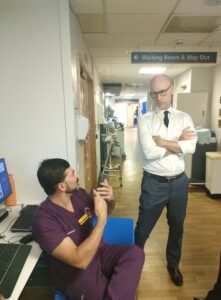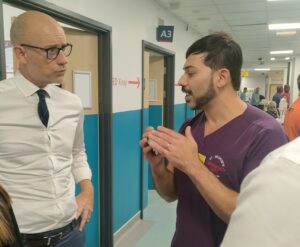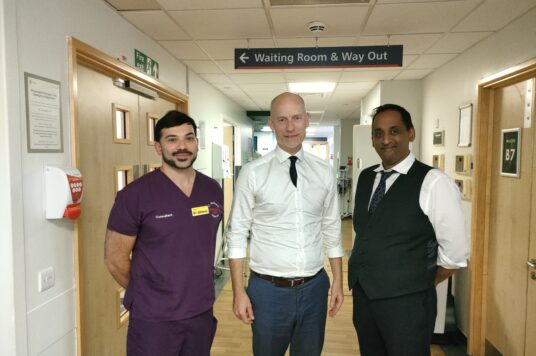Emergency department clinicians able to see more patients, thanks to new AI tech
Hands-free AI technology that gives doctors more time to see their patients has been piloted at St George’s in the largest, most extensive trial of its kind.
Tech trialled in the emergency department halved the time it took clinicians to do paperwork, saving each an additional 47 minutes – the equivalent of one patient per shift.
St George’s was the only emergency department to take part in the pilot, run by Great Ormond Street Hospital and funded by NHS England, examining how AI note-taking can free up time in the NHS.
Dr Ahmed Mahdi, Consultant in Emergency Medicine for St George’s University Hospital NHS Foundation Trust, said: “In such a fast-paced, high-pressured environment, every second counts – and this technology allows us to be more efficient, cut down on admin, and ultimately focus on patient care.

Minister Stephen Kinnock and Dr Ahmed Mahdi
“Better use of technology is central to the future of the NHS, and it’s exciting to be at the forefront of an innovative pilot that’s truly reshaping how we deliver care.”
Yesterday (3 September) Dr Mahdi was joined by St George’s, Epsom and St Helier’s Group Chief Transformation Officer, Ralph Michell, and Dr Shankar Sridharan, Chief Clinical Information Officer at Great Ormond Street Hospital, to talk about the tech and the pilot with Health Minister Stephen Kinnock.
Minister Kinnock was given a tour of the emergency department, as well as a demo of the TORTUS AI-scribing tool – which was also found to increase patient capacity by 13.4% per shift.
He said: “This is exactly the kind of innovation we need as we work to build an NHS fit for the future and end hospital backlogs.
“By freeing up clinicians from administrative burden to spend more time with patients, we’re not just improving efficiency – we’re enhancing the human connection that sits at the heart of great healthcare.”

Minister Stephen Kinnock and Dr Ahmed Mahdi
Dr Sridharan said: “This trial is significant as it shows the NHS can lead the way in safely adopting AI. Innovation can’t happen in isolation and by working collaboratively to test this technology across London – from hospitals to ambulances – we’ve proven it can work at scale and make a real difference for both patients and clinicians.”
Dr Vin Diwakar, Clinical Transformation Director at NHS England, said: “Allowing clinicians to spend nearly 25% more of their time interacting with patients and less time typing into a computer improves patient care and reduces the burden of administrative tasks.
“We’re striving to bring the benefits of innovations like this to the frontline so we can transform healthcare for patients as part of the 10 Year Health Plan.”


